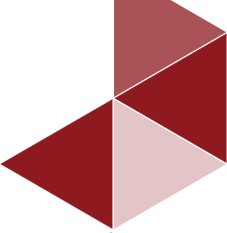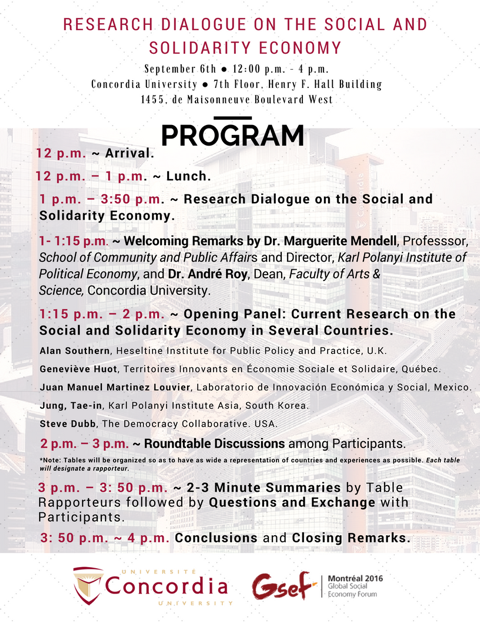Related events, organized by independent committees, will be held before the GSEF2016. These events will broach issues that are complementary with the forum’s themes. You must register to the following activities during your registration.
Culture Montréal – September 6, 9:00 to 11:30 pm
(free of charge)
Culture and social economy : how to converse with local governments to establish long-lasting and innovative partnerships?
Théâtre Paradoxe
5959 Monk blvd.
This seminar will be an opportunity to discuss the role of arts and culture in the development, revitalization and revival of communities. How can a social economy cultural agency become a lever for a whole city, neighbourhood or even a business district? We will also explore collaboration tools targeting cultural organizations and local administrations, and the challenges and issues related to establishing strong and lasting partnerships with local governments. We will look at two examples of organizations that play an important role in local development, as a gathering point and centre of cultural vitality in Montreal: Théâtre Paradoxe and Ateliers créatifs Montréal. A discussion with the participants and a guided tour of the sites will conclude the seminar.
This event is presented by Culture Montréal and Ateliers créatifs Montréal, with the participation of the Fernand-Dumont Chair on culture.
Note: This seminar will be the first stop on the Arts and Culture at the Service of the Community site visit. Register to participate in this visit.
Research- September 6, 12:00 to 4:00 pm
(free of charge, in English)
Research Dialogue on the Social and Solidarity Economy
Concordia University, Hall Building, room 763 (7th floor)
1455 de Maisonneuve West
Light lunch will be served
Program:
GSEF2016 and Concordia University are pleased to invite you to participate in a dialogue on research on the social and solidarity economy. This will be a unique opportunity for an extended conversation about current and future directions in research and an ideal setting to explore fruitful potential collaborations.
This dialogue will provide an opportunity for researchers, students, practitioners and local government representatives to learn about ongoing research in the many countries participating in GSEF2016 and to propose research priorities and explore possibilities for collaboration, including possible student exchanges. Some of the questions this conversation on research will address include: Are the challenges faced by the SSE similar in the many cities and countries represented at GSEF2016? What areas of research have SSE practitioners and municipal governments identified as priorities? Is new research also focusing on the intersections and convergences (or not) between the values and objectives of the SSE and social enterprise, social entrepreneurship, the collaborative and sharing economy, shared value, the solutions economy, and so on? Are these new economic relationships contemporary expressions of the legacy of the SSE? Has the recognition of the role of the SSE in achieving the UN 2030 Sustainable Development Goals generated new research questions? What is the contribution of international agencies that are increasingly recognizing and measuring the importance of the SSE?
An introductory panel with short presentations by researchers from different countries in the north and in the south will launch the discussion. Participants will be seated at tables to permit a sharing of ongoing research and future research plans. These will be summarized in a plenary by rapporteurs at the end of the afternoon.
Although this event is free for all participants, registration is required by July 31st at the latest. Information regarding the event will be updated once he opening panel speakers have been confirmed.
Housing – September 6, from 5:00 to 8:00 pm
(free of charge, in French)
Unconventional, Community-Based Visionary Property: Challenges and Issues.
Temps libre Mile-End, coopérative de solidarité
5605 avenue de Gaspé #106
Here and there we find unconventional, community-based visionary property initiatives emerging and developing. These initiatives redefine the commons by creating new forms of residential projects, community service buildings and even land for urban agriculture. By questioning the manner in which we live in our homes and occupy our neighbourhoods, these projects contribute to transforming the dominant paradigms on matters of urban development. Still, the challenges they face are colossal and require uncommon tenacity.
The meeting will begin with a quick presentation of three of unconventional property initiatives, then break into a discussion in sub-groups around the challenges and issues that are inherent to them: funding, property, internal organization, scope. Collectif 7 à nous and Vivacité – Société immobilière solidaire convene developers of similar projects in Quebec, community and social economy actors, researchers, and the general public interested in these questions to partake in this discussion on the potential of unconventional property projects.
This event is presented by Collectif 7 à nous, Vivacité – société immobilière solidaire and Archisolidaire.

